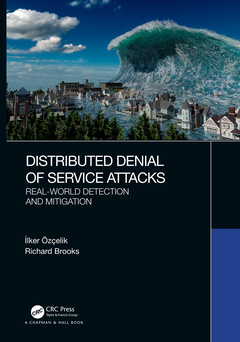Distributed Denial of Service Attacks Real-world Detection and Mitigation
Auteurs : Özçelik İlker, Brooks Richard

Distributed Denial of Service (DDoS) attacks have become more destructive, wide-spread and harder to control over time. This book allows students to understand how these attacks are constructed, the security flaws they leverage, why they are effective, how they can be detected, and how they can be mitigated. Students use software defined networking (SDN) technology to created and execute controlled DDoS experiments. They learn how to deploy networks, analyze network performance, and create resilient systems.
This book is used for graduate level computer engineering instruction at Clemson University. It augments the traditional graduate computing curricula by integrating: Internet deployment, network security, ethics, contemporary social issues, and engineering principles into a laboratory based course of instruction. Unique features of this book include:
- A history of DDoS attacks that includes attacker motivations
- Discussion of cyber-war, censorship, and Internet black-outs
- SDN based DDoS laboratory assignments
- Up-to-date review of current DDoS attack techniques and tools
- Review of the current laws that globally relate to DDoS
- Abuse of DNS, NTP, BGP and other parts of the global Internet infrastructure to attack networks
- Mathematics of Internet traffic measurement
- Game theory for DDoS resilience
- Construction of content distribution systems that absorb DDoS attacks
This book assumes familiarity with computing, Internet design, appropriate background in mathematics, and some programming skills. It provides analysis and reference material for networking engineers and researchers. By increasing student knowledge in security, and networking; it adds breadth and depth to advanced computing curricula.
Table of Contents
List of Figures
List of Tables
Foreword
About the Authors
Acknowledgements
Preface
Contributors
Introduction
What is DDoS?
History and Motivation
Legal Considerations
DDoS Research: Traffic
DDoS Research: Testing
DDoS Research: Evaluation
Attack Detection
Deceiving DDoS Detection
Detecting DDoS Attack Traffic
Attack Mitigation
Security and DDoS in SDN: Opportunities and Challenges
Denial of Service Attack in Control Systems
Denial of Service Attack on Phasor Measurement Unit
DDoS Lab
Conclusion
Appendix
Bibliography
Index
Dr. İlker Özçelik's background includes both researching network security and teaching University classes in the electrical engineering program. He has organized many cyber security awareness workshops and has given speeches to attendees from both government agencies and private industries in Turkey. He also served as a member of the Cyber Security Working Group at Council of Higher Education in Turkey and Information and Cyber Security National Science and Advisory Board at Information Security Association of Turkey.
Dr. Özçelik has a B.S. in Electronics and Communication Education from Marmara University, M.S. in Electrical Engineering from the Syracuse University, and Ph.D. from Electrical Engineering in the Holcombe Department of Electrical and Computer Engineering, Clemson University.
He worked as an Assistant Professor with the Department of Electrical and Electronics Engineering of Recep Tayyip Erdogan University for three years. He is currently an Assistant Professor and Department Chair of Information Systems Engineering at Recep Tayyip
Erdogan University.
Dr. Brooks’ background includes managing computer networks that span continents, performing sponsored research, and teaching university classes. His research has been sponsored by both government and industry, including:
- The Office of Naval Research (ONR),
- The Air Force Office of Scientific Research (AFOSR),
- The National Institute of Standards and Technology (NIST),
- The National Science Foundation (NSF),
- The Army Research Office (ARO),
- The United States Department of State,
- The Defense Advanced Research Projects Agency (DARPA), and
- BMW Manufacturing Corporation.
He has a B.A. in Mathematical Sciences from The Johns Hopkins University Whiting School of Engineering, and a Ph.D. in Computer Science from The Louisiana State University. He has worked in the United States, Fr
Date de parution : 06-2020
17.8x25.4 cm
Date de parution : 08-2020
17.8x25.4 cm
Thèmes de Distributed Denial of Service Attacks :
Mots-clés :
Attack Traffic; network security; DoS Attack; cyberwar; Background Traffic; software defined networks; Source IP Address; cyber attack; Spoofing Attack; performance analysis; Operational Network Data; network design; Mitigation System; Detection Approaches; Cps; DoS; SDN Controller; PMU Measurement; Destination IP Address; Attack Detection; Content Delivery Networks; ICMP; Network Traffic; UDP Packet; Normalized Entropy; VPN Tunnel; Tcp; Launch DDoS Attack; Python API; CSV Format; PDC



